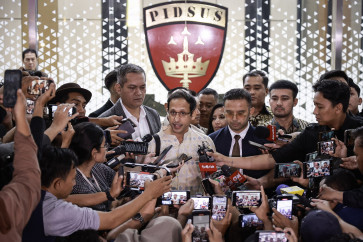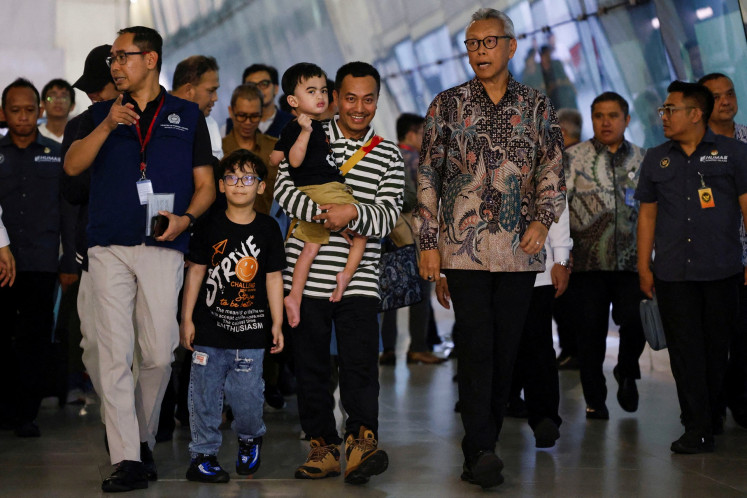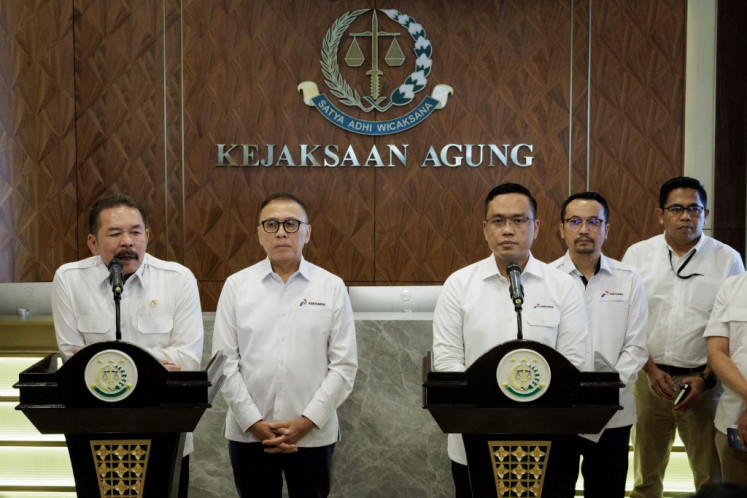Popular Reads
Top Results
Can't find what you're looking for?
View all search resultsPopular Reads
Top Results
Can't find what you're looking for?
View all search resultsArianespace pins hope on reliability to survive competition
Satellite launch service provider Arianespace aims to stay ahead of the competition through the introduction of a new and cost-efficient launch vehicle
Change text size
Gift Premium Articles
to Anyone

S
atellite launch service provider Arianespace aims to stay ahead of the competition through the introduction of a new and cost-efficient launch vehicle.
A new launch vehicle called Ariane 6 is currently under development, with a first test flight scheduled for 2020. The French multinational company claims that the vehicle can drive down launch costs to compete with the aggressive pricing offered by United States startup SpaceX, founded by tech entrepreneur Elon Musk.
“The service is going to be as competitive or more competitive than SpaceX,” Jacques Breton, Arianespace senior vice president in charge of sales and business development, said on Tuesday in Singapore.
“Let’s say it is going to be at market price,” he added, indicating that the launch price is unlikely to be cheaper than its strongest rival in the market.
The launch price of a Falcon 9 owned by SpaceX stands at roughly US$62 million, according to SpaceX’s website.
Arianespace’s goal, Breton added, is to maintain its position as an industry leader, as it now holds 50 percent of global market share, competing head-to-head with SpaceX. Other competitors in the market include International Launch Services, which market the Russian Proton rockets.
Despite being new in the market, SpaceX has been able to gain market share fast due to its unique selling point of using partially reusable rockets — specifically the first stage of Falcon 9 — that can save costs for each mission.
Earlier in March, SpaceX made history by flying a reused rocket into space and back again.
“That is going to be, ultimately, a huge revolution in spaceflight,” Elon Musk said as quoted by Bloomberg.
Besides Space X, space-exploration company Blue Origin, founded by Amazon founder Jeff Bezos, is also racing to make rocket reusability a reality.
Responding to this, Arianespace said the company would maintain its current strength of launching two satellites in one rocket instead of opting for reusable rockets. Reliability and on-time performance will remain the core strengths of its business.
“It is no longer acceptable to blow up satellites. We design launch vehicles and they work from the first launch. That’s how we differentiate ourselves,” Richard Bowles, managing director for Arianespace’s ASEAN
region, said.
“There are other suppliers that basically “test”, or reuse a rocket, until it blows up. We don’t think this is a good approach.”
At present, Arianespace has maintained its performance in the Asia-Pacific, with satellite launch customers spreading from Australia, India, Indonesia, Japan and Korea.
This year, the firm has successfully launched the Telkom 3S satellite for state-owned telecommunications operator Telkom and the KOREASAT-7 for South Korea’s satellite service provider KT SAT.
Three further satellite launches are in the pipeline this year using the Ariane 5, namely the GSAT-17 and GSAT-11 satellites for India and the BSAT 4-a for Japan.
The Ariane 5 has successfully launched 78 satellites since 1981, 17 of which belong to telecommunications operators in the Asia Pacific region.
Currently, the company has three launch vehicles, namely the Ariane 5, the Soyuz and the Vega. This year, Arianespace is planning for 12 launches, seven carried out by Ariane 5, three by Vega and two by Soyuz.
Its launch sites are located at the Guiana Space Center in French Guiana, near the equator in South America, and in Baikonur, Kazakhstan.
The company booked 1.4 billion euros (US$1.57 billion) in revenue last year. It has 4.9 billion euros in orders, consisting of 51 launches and 28 customers.
Arianespace is a subsidiary of Airbus Safran Launchers, which holds 74 percent of its shared capital.









